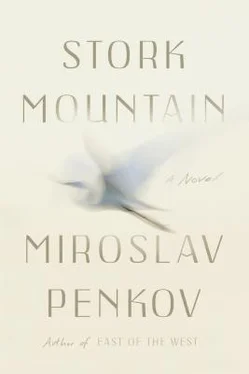Miroslav Penkov - Stork Mountain
Здесь есть возможность читать онлайн «Miroslav Penkov - Stork Mountain» весь текст электронной книги совершенно бесплатно (целиком полную версию без сокращений). В некоторых случаях можно слушать аудио, скачать через торрент в формате fb2 и присутствует краткое содержание. Год выпуска: 2016, Издательство: Farrar, Straus and Giroux, Жанр: Современная проза, на английском языке. Описание произведения, (предисловие) а так же отзывы посетителей доступны на портале библиотеки ЛибКат.
- Название:Stork Mountain
- Автор:
- Издательство:Farrar, Straus and Giroux
- Жанр:
- Год:2016
- ISBN:нет данных
- Рейтинг книги:4 / 5. Голосов: 1
-
Избранное:Добавить в избранное
- Отзывы:
-
Ваша оценка:
- 80
- 1
- 2
- 3
- 4
- 5
Stork Mountain: краткое содержание, описание и аннотация
Предлагаем к чтению аннотацию, описание, краткое содержание или предисловие (зависит от того, что написал сам автор книги «Stork Mountain»). Если вы не нашли необходимую информацию о книге — напишите в комментариях, мы постараемся отыскать её.
Stork Mountain — читать онлайн бесплатно полную книгу (весь текст) целиком
Ниже представлен текст книги, разбитый по страницам. Система сохранения места последней прочитанной страницы, позволяет с удобством читать онлайн бесплатно книгу «Stork Mountain», без необходимости каждый раз заново искать на чём Вы остановились. Поставьте закладку, и сможете в любой момент перейти на страницу, на которой закончили чтение.
Интервал:
Закладка:
And what about Aysha? I wanted to ask her. What would she do without you? This answer too I knew already. Elif would not allow her sister to walk down the same path she herself had once taken. She would not reward the little girl’s extortions. Every night for many years Elif had begged Allah to cut the rope that tied her to Aysha. Yet Allah would not cut the rope for her, as he would not for anybody. All along, Elif understood now, she’d held a knife but had feared to use it. Now at last, she was ready. Aysha would be better off without her.
“Where will you go?” I mumbled. She took some time to think it over, though I don’t think she was deciding. She was afraid to tell me.
“Turkey,” she said. “Where else?” She turned around to face me. “American, give me some of that money. Two or three thousand.”
I brought the wad from the drawer in which we kept it. “Take it all,” I insisted.
“I can’t do that.”
“Sure you can. I’ll feel much better.”
“ Amerikanche ,” she said. I wiped my cheeks and tried laughing, like it was a big joke. Then something turned inside me. I almost shouted, Wait. Hear me out. Listen!
There is always suffering in life. Those before us have suffered and we too must suffer. But there is also happiness, merriment, bliss. To be alive is to hurt and to laugh, not just one or the other. To laugh after you’ve hurt, while you’re hurting, that’s a great thing. Stay with me, I wanted to tell her. Let’s learn to accept the world together.
All I managed was to mumble I loved her. By now she too was crying. “What am I going to do without you?” I said, and she didn’t answer.
* * *
That afternoon she made me cut her long hair.
“I can’t be Lada,” she said. “I can’t carry you around in my hair.”
I spread old newspapers on the floor of our room and when we were done I wrapped the locks in the paper. “Burn them,” she said, and I promised I’d do it. She knew I was lying.
Once again, she was the way I first saw her — boyish, her cheeks sharper with the short hair. But she was not at all the same now. She bore on her face some great lightness.
We spent the night in each other’s arms, crying from time to time, but saying nothing. With the dawn she kissed me. I drifted away and when I woke up it was past midday. Rain drummed on the windows. The wad of money lay untouched where I’d left it.
I heard the knocking of dice from the terrace. A silly hope seized me. I jumped out of bed, sprinted. Grandpa was rolling alone, smoking. Saint Kosta lay in his corner.
“My boy,” Grandpa said when he saw me.
I pulled up a chair, sat down, quiet. But in my mind I was already running. Through the yard, toward the ruins, out of Klisura. In my mind I was crossing the fence at the border. She couldn’t have gotten that far. With some luck I would catch her.
Then even in my mind I knew better. One night, when she’d first moved into our house, Elif had cuddled in bed beside me. “All my life,” she’d whispered, “I thought I was a rebel. In a world of fire dancers I thought I was the fire. But now I see, amerikanche , all along it’s you who’s the fire. You just don’t yet know it.”
At last, I too knew it. Fire did not return where it had passed once. Fire did not burn backward.
PART SEVEN
ONE
LOOK. SEE: NAZAR AGA, tall, terrible, rides at the head of his fifty soldiers — the new guards of the sultan, Muhammad’s Victorious Army. Tucked in his red sash — his whip, his knife, his pistol. And beside them — the grand vizier’s firman. “You are to go, Nazar Aga,” the firman orders, “to the Strandja Mountains, to the Hasekiya. You are to meet there with Salih Baba, its ruler. And when you do — you are to end them. Both the place and its ruler.”
Nazar Aga is now an old man. Yet still, he can’t ride slowly. His blood is boiling and its vapor dyes all he sees in red — the mud, the rocks and trees, the mountain. The Hasekiya, he thinks, and spits to the left of his scarlet horse. For hundreds of years the Christians there have been spared from high taxes, allowed to worship their god freely. And Salih Baba! Nazar spits to the right side. The governor who’s built for his Greek wife a Christian chapel in the middle of his konak ; who’s never erected a single mosque, but with whose permission the raya is constructing churches! A Bektashi dervish, and once upon a time a leader of the janissaries.
No. Spittle is not enough for such a man. The knife is not enough. Nor is the pistol.
Nazar Aga pulls out his whip and lashes — the horse, his own leg, he pays no mind to what the whip is striking. The horse flies up the narrow pathway; the soldiers struggle to keep up. Scarlet clouds are thickening the sky and scarlet rain is falling.
“Wait for me, Salih Baba. I’m coming. And with me, I’m bringing you a sweet gift. The sultan’s will. Allah’s judgment.”
* * *
It is known that Murad I, the Godlike One, established the Ottoman Empire. He brought most of the Balkans under his rule, called himself sultan for the first time, and first instituted the devshirmeh —the recruit, the blood tribute. Every five years the strongest Christian boys were taken away from their parents, converted into the right faith, trained harshly, and so transformed into the sultan’s most faithful soldiers — the janissaries. When a janissary was ready to serve, a Bektashi dervish blessed him. It was the Bektashi order, an old and mystic brotherhood, that guided the order of the janissaries. The two entwined the way the oak and ivy do.
The centuries rolled on; the janissaries grew greedy. First they wanted more money, and when the sultan refused, they rose in arms against him. So he paid them more, and after, with each new sultan, their salary increased. As did their want — to marry, to own land, to conduct private trade. All of these privileges they were given, yet their greed remained unquenched. It turned them from servants into masters, but it also made them weak and lazy. No longer were they undefeatable in battle.
When, after a shameful military loss, Sultan Osman II vowed to disband the order, the janissaries revolted and killed him. When Salim III attempted to reform them, they had him deposed.
At last Mahmud II came to power. He tricked both the janissaries and the Bektashis; he made them think he was their ally, but secretly he plotted, surrounded himself with allies of his own. One day in June, the year 1826, he issued a fatwa — he was to form a brand-new, modern army. He knew the janissaries would revolt and when they did he torched their barracks; thousands were burned alive. Those the sultan didn’t burn, he beheaded. Those he didn’t behead, he exiled.
With time the janissaries disappeared, but the Bektashi roots ran deep. They had been growing, spreading for centuries on end. So here now is Salih Baba, some twenty years later. Still governing the Hasekiya.
And here now is Nazar Aga, galloping through the Strandja, and in his sash: a knife, a gun, a firman.
* * *
Nazar Aga was once a janissary. He had a different name back then, a name that Mehmed Dede, the holy Baktashi leader, had given him himself. Why Nazar chose to betray his brothers no one knows. But it is known Nazar’s was the hand that brought the first torch to the barracks, and his the yataghan that slew the most men.
Another thing too is known. How Nazar first earned the sultan’s trust. What he told him, what he did.
* * *
This is what Nazar told the sultan when the two first met in the throne room. This is what Nazar did to prove he could be trusted: “When I was young, Mehmed Dede himself blessed me,” Nazar told the sultan. “Only, he didn’t put his hand on my shoulder, as is the custom, but leaned forward and kissed my right eye. Truly a great honor. And now, to prove I can be trusted, I shall gouge out that eye.”
Читать дальшеИнтервал:
Закладка:
Похожие книги на «Stork Mountain»
Представляем Вашему вниманию похожие книги на «Stork Mountain» списком для выбора. Мы отобрали схожую по названию и смыслу литературу в надежде предоставить читателям больше вариантов отыскать новые, интересные, ещё непрочитанные произведения.
Обсуждение, отзывы о книге «Stork Mountain» и просто собственные мнения читателей. Оставьте ваши комментарии, напишите, что Вы думаете о произведении, его смысле или главных героях. Укажите что конкретно понравилось, а что нет, и почему Вы так считаете.











